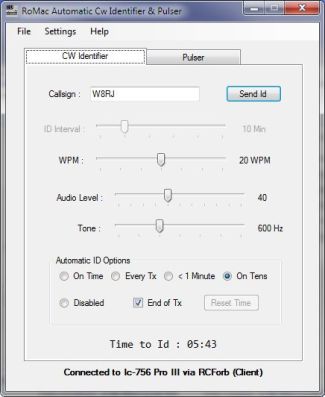|
Features
- Adjustable CW speed 5 to 35 wpm
- ID time interval 5 to 30 minutes
- Six different options when to send the CW
Identification, including a manual send.
- Compatible with most commercially manufactured sound
card interfaces. See FAQ for
setup with the Rig Blaster Pro, Rig Blaster Plus,
Rig Blaster Plug and Play, MFJ 1275, and MFJ 1279.
(Limited features with some sound card interface units)
- Support for Yaesu 101D, 450, 847, 897, 920, 950,
891,991,1000,1000MP,1200, 2000,
3000, 5000, and 9000.
- Icom 7000,7100, 7200, 7300, 7410, 746, 746 Pro, 756 Pro, 756 Pro
II, 756 Pro III, 7600, 7610, 7700,7800,7850, 9100, 9700.
- Kenwood 480, 570, 590, 890, 990 and 2000
- Elecraft and Flex radios.
- Support for the new USB audio enabled radios,
Icom 7100,7200,7300,7410,7600,7610,7850,9100 9700, Yaesu FT-991,3000 and Kenwood 590,890,990
- Able to connect to HRD's IP server, so you can run
HRD and it's suite of programs all at the same time.
(HRD needs to have a TX button)
- Built in controls for the sound card.
- Selection of sound card
independent of preferred sound devices.
- Simple to interface to your present transceiver.
- Build your
own
interface with easily obtainable parts.
- Complete help file included.
- Requires 16 bit SoundBlaster compatible sound card (See
FAQ).
- Check for updated
versions with a simple menu choice.
|
|
RoMac Software's Automatic CW Identifier and Tuning Pulser sends your callsign at
programmed intervals, to ensure your stations compliance with FCC
regulations. No more forgetting to ID.
The RoMac Automatic CW Identifier can either send out your call sign with
Morse code through your sound card as audio, or it may be programmed to
utilize the DTR signal line on a serial port and send out Morse code using
the manual CW key jack on your radio.
The software is able utilize strictly CAT
commands to generate the ID and Pulser signals. (Kenwood 480,590,990,
and 2000. Yaesu models, FT-450,FT-950,FT-991,FT-1200,FT-2000, FT-3000,FT-5000, and
FT-9000. Flex radios based on Power SDR2.x. and the Elecraft K3.
(SmartSDR supports I'der, not pulser)
When using the DTR or CAT command methods, the
software will key your radio, shift the frequency, change the mode to
CW, send out your identification, and then restore the mode and
frequency, all automatically.
The new USB audio
capable radios, Icom 7200, 7300, 7410, 7600, 7610, 9100, Yaesu FT-991, FT-3000 and the Kenwood
590 only
requires one USB cable between your computer and radio. What could be
simpler!
For Flex Radio users, the software will enable the transmit VAC in your
Flex Radio when sending out the ID, and then disable the VAC in the
radio when done sending its ID, thereby re-enabling your microphone for
VOX.
Whether you choose to use the audio option, or the serial port "DTR"
option, connecting your radio is a snap. An audio interface can be as
simple as an audio isolation transformer between the sound card in your
computer, and a transmit audio input on an accessory jack. Selecting the
DTR option, requires a simple one transistor and one resistor circuit,
and a second serial port
to send the ID to your radio.
The fully programmable serial port interface will work with most sound card interfaces or by
utilizing CAT/CIV commands later model radio's.
If you are already using a CAT/CIV program such as Ham Radio Deluxe, the
interface to your radio is almost complete. All that is needed is to
interface your sound cards audio out, to a transmit audio input with an
isolation transformer, or by utilizing a second serial port to key your
radio in the CW mode via a manual key jack.
The RoMac CW Identifier 2012 also has the capability to connect the the
Ham Radio Deluxe IP Server, to make connecting to your radio even
simpler. You can have HRD running and the Automatic CW Identifier will
share HRD's IP Server port with all your favorite HRD programs such as
their logbook, or DM 780 program.
With the RoMac Automatic CW Identifier flexible and fully programmable
interface, it will fit into almost any station setup.
The program is written with the latest .NET Framework 4.0 from
Microsoft, ensuring trouble free operation and installation, and forward
compatibility with Windows 8.CW speed speed is fully adjustable from 5
to 35 wpm, ID time interval ranges from 5 to 30 minutes in
one minute increments.
Choose from six different and convenient options of
when to send you station identification, to match your
operating style and tastes.
The Pulser aka "Pulse Tuner" sends a
series of short audio tones or keys your manual CW jack
rapidly, enabling you to tune your
amplifier or antenna tuner, without worrying about
overheating those expensive amplifier tubes or antenna tuner
parts.
The Tuning Pulser duty cycle is
adjustable fro 1% to 100%. The software can be
programmed to send your ID after tuning with the Pulser.
Take your time, tuning your amplifier
optimally using the RoMac Pulser. Considering the cost of
replacing amplifier tubes, the RoMac Pulser is a bargain!
If you don't presently
have a
sound card interface a complete schematic for a basic yet
fully functional interface is included
here and
in the help files. All parts are available at your local
Radio Shack store.
The RoMac Pulser is compatible with all
transmitters, from Icom, Kenwood, Yaesu, and others. Will work with any amplifier on the market
today or any older amplifier.
The free evaluation software runs for 7.5
hours of cumulative running time.
Price is only $24.95, which includes email and/or
phone support, and licensing for two computers.
|
